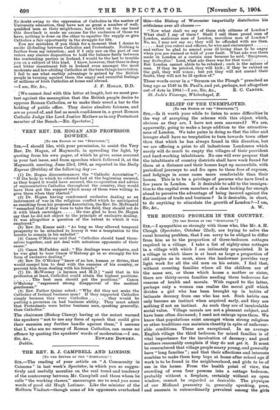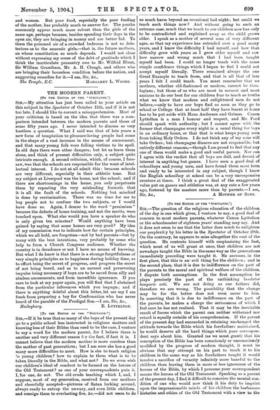sympathise so strongly with those who, like Mr. A. H.
Clough (Spectator, October 22nd), are trying to solve the rural housing problem, that I am sorry to be obliged to differ from him as to the proportion of three. bedroom cottages required in a village. I take a list of eighty-nine cottages in a village with which I am intimately acquainted. It is a village in which there is at least as large a proportion of old couples as in most, since the landowner provides very light work for all the old men on his estate. I find that, without counting families where all the children are of the same sex, or those which house a mother or sister, there are thirty-seven families needing three bedrooms for reasons of health and morals. With regard to the latter, perhaps only a woman can realise the moral gulf which divides a girl who has been brought up in habits of intimate decency from one who has not. Such habits can only become an instinct when acquired early, and they are nothing if not an instinct. As such they are of incalculable social value. Village morals are not a pleasant subject, and have been often discussed; I need not enlarge upon them. We know that populations exist amongst whom strong religious or other traditions can maintain chastity in spite of unfavour- able conditions. These are exceptional In an average English village the third bedroom for mixed families is of vital importance for the inculcation of decency; and good mothers reasonably complain if they do not get it. It must be remembered that village people marry young, and generally have "long families"; and that their affections and interests combine to make them keep boys at home after school age if
of
work is to be found in the neighbourhood, and girls to be use in the house. From the health point of view, the crowding of even four persons into a cottage bedroom, probably without a fireplace, certainly without an open window, cannot be regarded as desirable. The physique of our Midland peasantry is, generally speaking, poor, and anaemia is extraordinarily prevalent among the girls
and women. But poor food, especially the poor feeding of the mother, has probably much to answer for. The youths commonly appear much more robust than the girls of the same age, perhaps because, besides spending their days in the open air, they are bringing in money and are better fed. To them the poisoned air of a crowded bedroom is not so dele- terious as to the anaemic girls,—that is, the future mothers, on whose constitution so much depends. I would not close without expressing my sense of the debt of gratitude which I think the inarticulate peasantry owe to Mr. Wilfrid Blunt, Sir William Grantham, Mr. A. H. Clough, and others who are bringing their houseless condition before the nation, and suggesting remedies for it.—I am, Sir, &c.,
The Temple, B.C. MARGARET L. WOODS.



























































 Previous page
Previous page